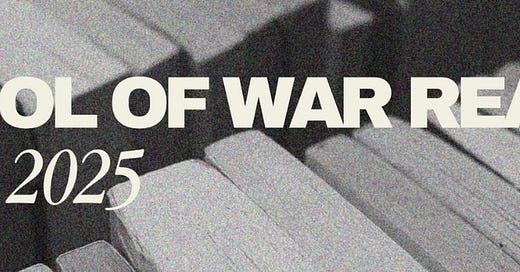The School of War Reader: Tactical Developments During the Third Year of the Russo–Ukrainian War
Tactical Developments During the Third Year of the Russo–Ukrainian War
Jack Watling and Nick Reynolds, Royal United Services Institute
This report, published right before the third anniversary of Russia’s invasion of Ukraine, identifies tactical battlefield developments in Ukraine:
Much of the war is recognisable from early 2023, characterised by the artillery battle and layered defences of trenches and fortifications. Yet Russian adaptations have aggregated and become an offensive triangle of three primary combined arms that are creating competing dilemmas for Ukrainian forces. First, the AFRF continue to pin down Ukrainian ground forces on the line of contact with infantry and mechanised forces, much as in the second and third years of the conflict. Second, they prevent manoeuvre and inflict attrition with first-person view drones (FPVs), Lancet drones and artillery firing both highexplosive shells and scatterable mines. Third, the AFRF has increased its use of UMPK glide bombs against Ukrainian forces who are holding defensive positions.
Trump, Xi, and a Brewing Battle Over the Indian Ocean
Mike Watson, The Washington Free Beacon
How a free and open Indian Ocean may be threatened by Beijing, Tehran, and a proposed deal that would cede the Chagos Islands to Mauritius:
Since taking control of China, Xi Jinping has launched a series of ventures to overthrow the U.S.-led international order and replace it with one centered in Beijing. His signature Belt and Road Initiative and its accompanying 21st Century Maritime Silk Road are part of this plan. He aims to extract resources from Africa, turn them into manufactured goods in China, and export them to developed economies such as Europe and the United States. The Indian Ocean is right in the middle. … China is close to benefiting from an unforced British error. U.K. prime minister Keir Starmer is visiting Washington next week, in part, to request Trump’s approval to give away the Chagos Islands to nearby Mauritius. The Chagossians do not want to become part of Mauritius, where they were treated as second-class citizens.
Trump’s Foreign Policy Revolution
Matthew Continetti, The Free Press (paywall)
A thoughtful piece on the triumph of the restrainers:
Rather than expend further blood and treasure preserving America’s status as the global superpower, and aid democratic allies without conditions, Trump wants to rebuild alliance and security structures to reduce and delimit U.S. military and financial exposure. In other words, America under President Trump no longer acts as a status quo power. It is a revisionist power just as intent on changing the structure of international relations as are Russia and China. What that structure will look like once Trump is finished with it— and whether America will be a safer, richer place—is anybody’s guess.
The Euro-American Split (I): Dread Possibility
Tanner Greer, The Free Press
In 2011, Secretary Gates foreshadowed shifting American attitudes toward the transatlantic alliance:
There are decades when possibility is constrained in a narrow frame. The terrain has been surveyed, boundaries have been laid, and rules have been established. … But nothing human is everlasting. Always there comes a day when spectators search for better games and settlers seek out fresher pastures. That day of change arrives with much confusion and fanfare. Fourteen years ago, Robert Michael Gates foresaw such a day. To the ministers and officers of the North Atlantic he spoke, and gave this warning: With respect to Europe, for the better part of six decades there has been relatively little doubt or debate in the United States about the value and necessity of the transatlantic alliance. … Indeed, if current trends in the decline of European defense capabilities are not halted and reversed, future U.S. political leaders—those for whom the Cold War was not the formative experience that it was for me—may not consider the return on America’s investment in NATO worth the cost.
77% of Americans concerned about Chinese ownership of TikTok as Trump admin scrambles to ‘save’ app
Thomas Barrabi, The New York Post
Recent polling reveals that most Americans do not want the Chinese Communist Party to control TikTok:
A whopping 77% of Americans say they remain concerned about the Chinese ownership of TikTok – even as the Trump administration scrambles to cut a deal to “save” the popular app, according to a national survey obtained by The Post. President Trump has until April 5 to find a US buyer for TikTok before his executive order delaying enforcement of a federal ban on the app expires. TikTok briefly went offline in January after its Chinese parent ByteDance ignored the Jan. 19 deadline to completely divest. Overall, 63% of Americans support either a complete ban of TikTok or a forced sale of the app to American owners. Just 19% prefer ByteDance to remain in control with increased US oversight, while 15% were fine with no changes to current ownership.










